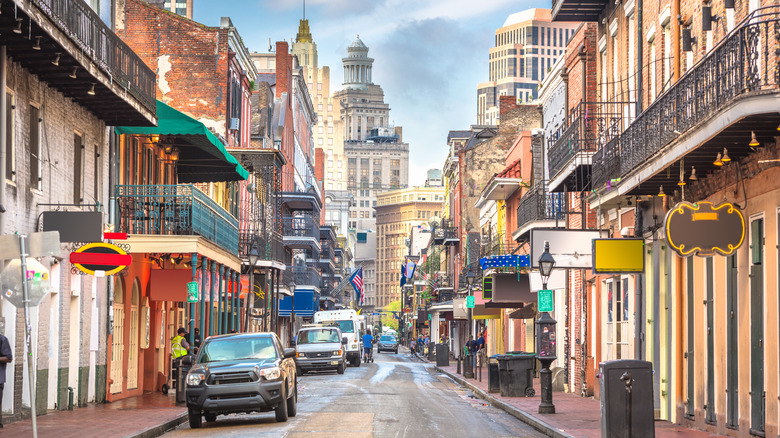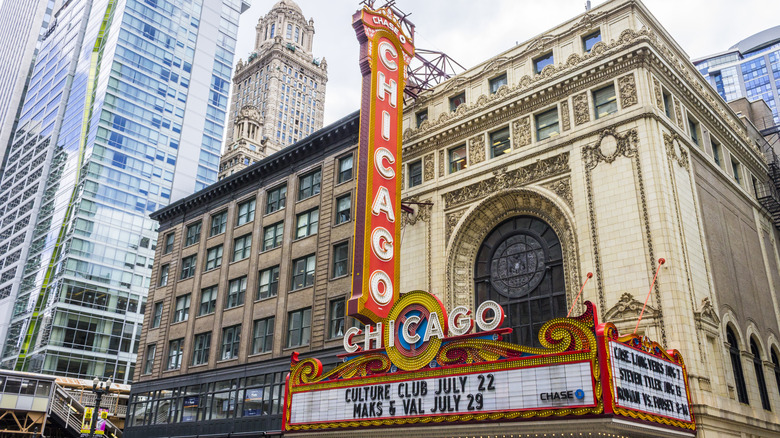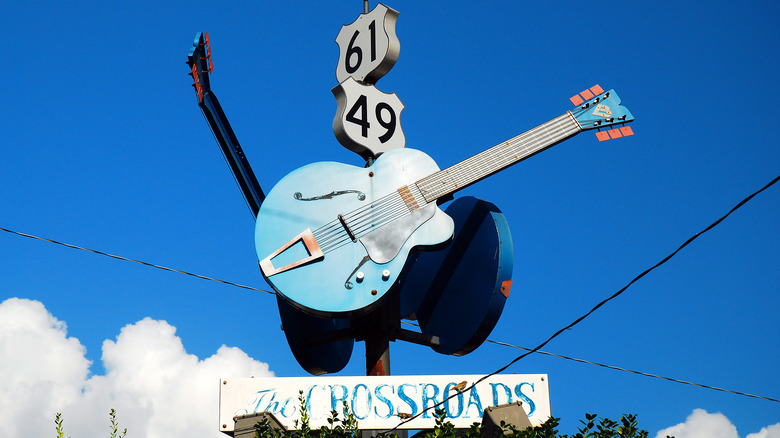This US Road Trip Route Is A Great Addition To Any Music Lover's Travel Bucket List
It's been said that jazz is the only form of art that's truly original to the U.S. Like the blues and other types of music, jazz is a rich part of America's cultural heritage, and you can experience that heritage by hitting the road and following in the footsteps of your favorite musicians. Why just listen to music on your car stereo when you can also visit some of the historical places associated with it?
New Orleans, often called the birthplace of jazz, might seem like a logical starting point, but it's on the Gulf Coast and could also be reserved for the big finish of a lengthier road trip. The city's thriving music scene extends from venues like Tipitina's to the annual New Orleans Jazz & Heritage Festival. Its music history can be felt in locations like Congo Square, once a gathering place on Sundays for enslaved Africans whose musical traditions brought a new rhythm to a city shaped by French and Spanish influences.
Standing outside Congo Square (now a part of Louis Armstrong Park), you can look down the street and see the famous steeples of St. Louis Cathedral. You can imagine how the European church music might have drifted downwind and combined with the park's dancing and drumming to create a kind of musical gumbo that's quintessential New Orleans. A road trip from Chicago to New Orleans will take you even deeper into the country's musical roots, beginning with the blues and ending with jazz.
From Chicago to Memphis
Never mind the band Chicago or even the musical "Chicago." Chi-town's best feature is its live music venues, from the intimate Lincoln Hall to the grand Chicago Theatre. The latter started out as a movie palace, and even if you can't catch a concert there, you can take its Marquee Tour, looking out from the stage and seeing inside dressing rooms with walls autographed by stars like Dolly Parton.
The Chicago Board of Trade Building — an Art Deco icon and U.S. National Historic Landmark — is where the long-running show "Soul Train," hosted by Don Cornelius, started back in 1971. Even after the show moved to L.A., soul pioneer Curtis Mayfield and other Chicago-born artists kept performing on it, bringing their sound to national TV. Chess Records, once the city's leading record label, even had a Rolling Stones song dedicated to it. Elsewhere, Gospel music's origins can be traced back to Pilgrim Baptist Church, home of the future National Museum of Gospel Music.
About 300 miles from Chicago, via I-55, is St. Louis, home of the National Blues Museum and the birthplace of Chuck Berry, the late "father of rock 'n' roll." In Memphis, Tennessee, you can see Sun Studios, which gave rise to early rock music, along with the historic Beale Street, recognized by Congress as the official "Home of the Blues." Elvis Presley's former Memphis estate, Graceland, still serves as a shrine to his career, and it's conveniently located right off the interstate.
From the Mississippi Blues Trail to New Orleans
Co-funded by the National Endowment of the Arts, the Federal Highway Administration, and other organizations, the Mississippi Blues Trail will take you around to different signs commemorating sites with significance in American music history. In Clarksdale, you can visit the Delta Blues Museum, which takes its name from the Mississippi River Delta and an earlier blues style often performed solo by singer-guitarists before the Great Migration took the music to Chicago and electrified it. Just around the corner, the street art and run-down buildings on Delta Ave (including the old WROX Radio building) speak to ongoing creative expression in one of Mississippi's poorest counties.
Downtown, you'll see the scattered sidewalk markers of the Clarksdale Walk of Fame, honoring musical luminaries from the area like Sam Cooke, John Lee Hooker, and Muddy Waters. The intersection between Highways 61 and 49 in Clarksdale has a guitar sign identifying it as "The Crossroads" where, according to rock legend, influential bluesman Robert Johnson walked out to meet the devil at midnight and sold his soul.
Once you arrive in New Orleans, you can enjoy its jazz street bands and ride the Steamboat Natchez down the Mississippi River. Before you cross the state line, stop off in Natchez, Mississippi, where you can learn about the dance hall fire at the Rhythm Club, an event that seared itself in memory through songs like the Howlin' Wolf number "The Natchez Burning."


